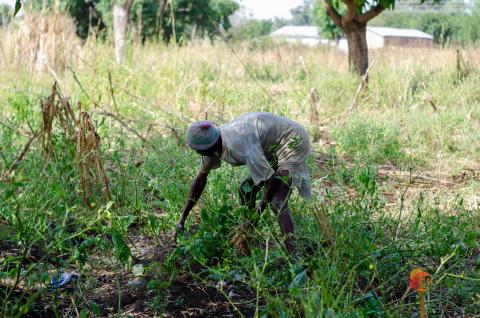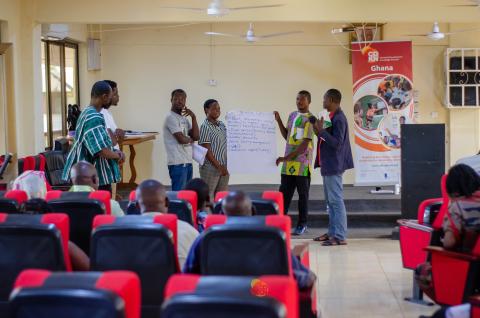Harnessing local solutions for climate action in northern Ghana
Harnessing local solutions for climate action in northern Ghana
Communities in the Upper West region of Ghana are using innovative approaches to adapting to a changing climate. Their efforts are rooted in their local knowledge, education, technology and collective action, and are helping to provide a roadmap for building resilience at the local level as the challenges posed by climate change evolve.
The adaptation journey in these communities demonstrates how climatic risks have changed over time. Initially, the main climatic pressure on communities in the region was crop failure due to unpredictable rainfall patterns, especially in the Lawra district. However, as the climate has altered, prolonged droughts have occurred and consequently bushfires have become common, posing a new threat to local communities. This shift underscores the need for flexible adaptation strategies that can effectively address both the agricultural and environmental challenges that a changing climate creates.
A key approach that could enhance effective adaptation is revitalising and adjusting traditional practices and knowledge to align them with current climate realities. For instance, in Lawra, the practice of converting organic waste such as crop residue, animal droppings and household waste into compost has emerged as a sustainable and efficient method to improve soil fertility for crop production. This innovation reduces reliance on chemical fertilisers which are often costly and may have negative implications for sustainable farming in the long term.

However, evidence from other areas of Northern Ghana suggests that some farmers struggle to adopt composting because the process is very labour intensive, especially transporting it from composting sites to the farm. To overcome the issue of labour constraints, some communities have initiated a communal labour system where support is provided for labour intensive activities including dry season gardening, agriculture, reforestation and fire management. These actions demonstrate the power of working together when climate challenges occur.
Another approach is integrating climate literacy into everyday practices. In Nadowli and nearby areas, agricultural extension services provided by the district’s Department of Agriculture have been instrumental in educating farmers about climate risks and adaptive measures. For instance the climate advisory resource centres managed by the district Department of Agriculture have been instrumental in educating farmers on how sustainable farming practices can enable effective adaptation. This approach emphasises the importance of demystifying climate science, making it accessible and ensuring that adaptive measures are actionable for the community.
Communication tools such as radio shows and community listening groups, supported by development partners such as GIZ and CDKN, are being used as part of the channels for early warning systems (including weather forecasting and bushfire alerts) and for discussions on adaptation options in Nandom and other locations. These tools have assisted in bridging information gaps and promoted a proactive approach towards climate adaptation, showing how important it is for national and local governments to invest in communication infrastructure and technology that can provide timely and relevant climate information. If communities can use this information to plan proactively, they will be able to respond more effectively to unpredictable weather patterns, especially rainfall.
Communities in the Upper West Region showcase how local communities can lead climate adaptation efforts. By combining local knowledge, promoting climate awareness, investing in technology and fostering collective action, communities in the region have the potential not only to tackle immediate climate risks but also to lay the foundations for a sustainable future. Their experiences can serve as a guide for other communities in Ghana and beyond, emphasising the significance of informed local leadership and collaborative approaches in effectively managing climate challenges.
The role of CDKN is to continuously work at community level to explore innovative approaches that enhance their collective action towards climate resilience. These insights were collected as part of field visits and key stakeholder engagement activities in the Upper West region, in line with the CDKN Ghana programme strategy. The CDKN Ghana programme has focused on providing the enabling platform that facilitates capacity strengthening and leadership in climate action for local and national stakeholders. This strategy is being achieved through approaches such as interactive workshops, community engagements, training programmes and policy engagements at the community level.

Read more on the Ghana programme website, www.cdknghana.org, and across our social media platforms - https://linktr.ee/cdknghana.
